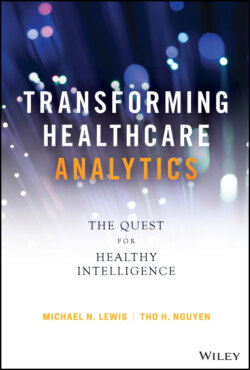Читать книгу Transforming Healthcare Analytics - Michael N. Lewis - Страница 20
GROWTH IN HEALTHCARE
ОглавлениеThe healthcare sector is a multi-trillion-dollar industry that continues to grow exponentially. Research studies and reports consistently show that the healthcare industry is not slowing down anytime soon. A recent 2018 study published by Deloitte, a consulting company, in collaboration with The Economist Intelligence Unit, reported double-digit growth from 2015 to 2020. In 2015, the global healthcare market was US$7.077 trillion and is expected to grow to US$8.734 trillion by 2020.1 Another study and report recently revealed that the global healthcare industry will swell to US$11.801 trillion by 2021.2 Healthcare is currently ranked the number-one industry driving the United States economy above technology, construction, and retail, based on data and industry perspectives from the Bureau of Labor Statistics.3
There are many reasons for the enormous growth in the healthcare sector. The primary reason is an aging population that requires diagnosis, treatment, and prevention of diseases or illnesses. The healthcare industry offers products and services to treat patients like us (you and me) with preventive, curative, and rehabilitative care for physical and mental impairments. These products and services are in high demand from the aging population, which uses healthcare the most. According to the United States Centers for Disease Control, citizens over the age of 65 experience three times more hospital days than the general population. From the same source, folks who are over 75 years of age have four times more hospital days compared to other population groups. As we age, healthcare becomes more essential in our daily lives.
Another reason for the growth in healthcare is the rise of chronic illnesses such as diabetes, heart disease, and cancer. According to Centers for Disease Control, six in ten adults have a chronic disease and four in ten have more than two chronic diseases in the United States. Diabetes is considered one of the top three diseases and diagnoses continue to increase. The International Diabetes Federation predicts that the number of people around the world who have diabetes will expand from 425 million in 2017 to 625 million by 2045, which is a staggering 47% increase in less than 20 years. Much of the chronic illnesses are attributed to poor nutrition, lack of exercise, and excessive alcohol and tobacco use.
Similarly, heart disease is also on the rise. The American Heart Association expects the number of people who have heart disease in the United States to escalate from 6.5 million between 2011 and 2014 to 8 million by 2030, making it another chronic disease that has double-digit growth of 23% in less than 15 years. The cost of caring for these types of conditions will lead to drastic growth in healthcare spending, higher expenses for patients and families, and added costs for providers.
Another rise in healthcare diagnoses and growing concern is mental diseases, which affect millions globally. While diabetes and heart disease have some type of treatment and/or cure, mental diseases such as dementia or Alzheimer's are often untreatable. This chronic disease has personally affected me. Several of my sponsors who brought me to America have been diagnosed with dementia. As many of you know, once a person close to you or a loved one is diagnosed with this chronic disease, it is heartbreaking to see how quickly that person's wellbeing and memory deteriorate. One minute they can recognize you and be very sound in their communication, then the next minute you are a stranger and there is no recollection of short-term memory. It is very hard to carry on a conversation and a struggle for the patient to find the words to converse with you. Mental illness is debilitating and drains the physical and emotional aspects of the patient, their family, and loved ones who are providing care.
Having witnessed this awful disease and cared for a loved one, it is extremely depressing that there is no cure in sight for dementia that is affecting millions of senior citizens. In 2017, Alzheimer's Disease International did a study and reported that there were about 50 million people living with dementia. In the same report from the same organization, it is projected that more than 125 million people will have dementia by 2050. This chronic condition will contribute to the rapid increase of healthcare expenses. It was reported in the same study that one trillion dollars was spent on treating and caring for dementia patients in 2017.
As the healthcare industry continues to grow and the demand remains high for services, there are many factors to consider. These factors all begin with data from you and me, who are the end users in a complex healthcare system. Let's examine what healthcare providers such as Cleveland Clinic are doing to improve healthcare with data and analytics.
